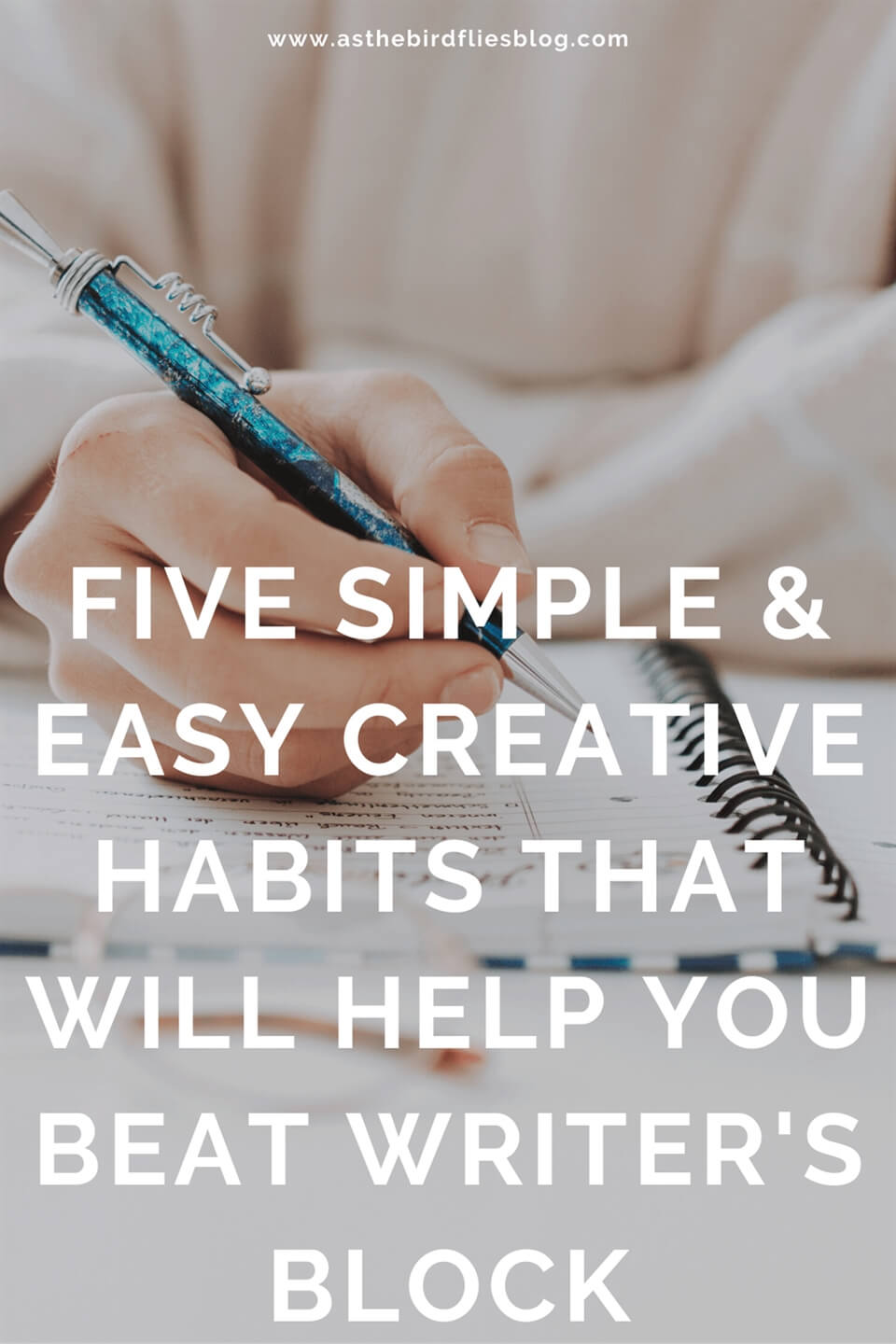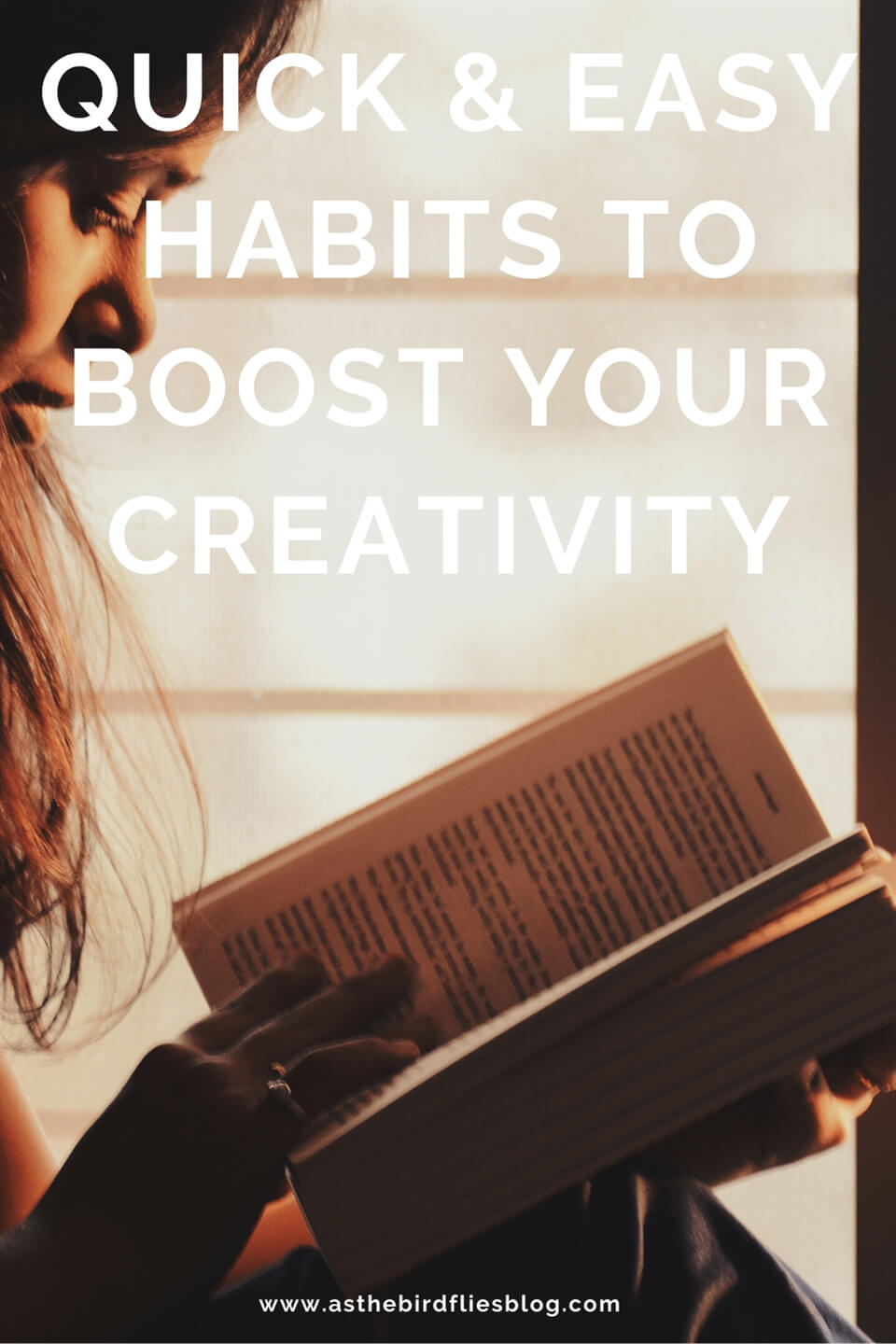On Writing: Best (& Easiest!) Creative Habits All Writers Should Try
The Best Creative Habits You Should Try
When it comes to building effective creative habits, it's important that they are easy to both start and maintain. There's no point trying to introduce a range of exciting and inspiring creative habits that you work hard to start but you're unable to keep going with them. By definition this means whatever you're trying - be it journaling, reading more, trying a new creative hobby - isn't a habit because it's not possible for you to keep it going.
As someone who has been writing fiction regularly (and publishing books!) for nearly ten years I have learned the hard way what works and what doesn't when it comes to the best creative habits. Personally, I have found that doing a little a lot is one of the most effective ways to bring a new creative habit into your life and to then go on and stick to it. I also find that the simpler I make it, i.e. write 2000 words a week or write for 20 minutes every day, it's easier to achieve and that sense of achievement gives you an energy boost. It's also why I'm a big advocate for creative writing challenges like NaNoWriMo as they have simple goals (albeit they are hard to meet every day for 30 days!) and there aren't many rules at all.
With all this in mind, I am happy to share this guest post with you about five simple, easy and very effective creative habits that all writers should try if they're stuck in a creative rut or struggling with writer's block. As I often share on my WriteNOW Cards Instagram page, the more you make creativity and being creative a part of your daily life, the more your creativity will grow and reward you with new ideas, creative energy for your works-in-progress and a lot of love for your creative life. So enjoy reading this post and I hope you find one or two creative habits that work for you.
The Importance of Creative Habits
Creative habits are very much worth thinking about and adopting. Creativity is by nature dynamic, with lots of ebbing and flowing depending on what is going in your life or the world around you. It can also sometimes be an almost elusive thing, and it can often feel like it disappears for days (or weeks or months or years!) at a time and then you're stuck with a bad case of writer's block. But on the other hand, it can also play out that creativity springs up from nowhere and inspiration strikes in strange, almost paradoxical ways. Ideas can appear out of nowhere and you are on a roll... but then days (or weeks or months or years!) later they disappear just as suddenly.
While some of this is out of our control, certainly when our lives may be busy or weighed down by other factors and events, there are always things we can do to encourage creativity to stay with us. As Frankie writes above, It may seem counter-intuitive, but no matter how fleeting and slippery creativity may feel, the reality is that there are things we can do to maximise creativity, and one of those things is having creative habits, and making time do do the creative things we love regularly, like building and committing to a daily writing habit.
If you wish to be more creative, try developing some creative habits that many other creatives and writers follow. Not all of them will work for you, but all of them have great potential to help you harness more creativity and avoid things like writer's block. Because the easiest habits to maintain are those that are simple, quick and easy to do, we're only really focusing on the habits you can do no matter what experience you have as a writer or creative, and you really don't need to do them all to experience greater creativity. Just pick one or two of these simple and easy creative habits and hopefully they will help you start developing your creativity right away!
The Best & Easiest Creative Habits for Writers (and ALL Creatives!)
1. Journal, Journal, Journal!
Though keeping a journal is an age-old and enduring practice for authors, painters, musicians, and virtually anybody involved in the creative process, it is a creative habit all writers should definitely try at least once in their lives to see if it works well for you.
Keeping a journal makes perfect sense if you think about it, as it's a way to clear some of the thoughts in your mind, work through them on a page, and practise the art of writing about feelings, experiences, people, and well, life, without judgement or being read. As writers, when so much of what we do is for others to read, it's very liberating to write only for ourselves, and to "clear our minds" as we do so we can focus on the other projects that we're working on without other busy and unrelated thoughts getting in the way.
If you're not sure what to write about, there are 1000s of articles online with journal prompts, but the most important way to approach it is without any rules or guidelines at all. You can write whatever you want. You can treat it like a diary exercise. Make an effort to describe the places you visit and the people who live there. What do you see in terms of food, plants, and architecture, and how do they look and smell? Try this for a couple days and you'll notice that writing down your thoughts enhances clarity and self-awareness, which in turn leads to new ideas, possibilities, and ways of being.
By writing every day, you warm up your creative muscles and make room for wonderful things. Additionally, if you ever find yourself feeling uninspired or stuck, you can always turn to your creative writing journal for new ideas.
If nothing else, by journaling as a creative habit, you'll be encouraged to face the white space in front of you. There’s no pressure to make what you write in your journal flawless, and you don’t even have to spell everything correctly. It may sometimes be as simple as one-word impressions or notes. Whatever you write is fine as long as you can understand it when you go back and read it later.
Journaling can be done at the same time every day or even on the go whenever you have something you want to jot down. Often, ideas and inspirations come to us in the form of flashes of light. It is our responsibility to seize such moments and keep them alive.
Keeping a journal handy is one such approach. Throughout history and even now, some of the most famous and successful people like scientist Leonardo da Vinci, painter Frida Kahlo, and entrepreneur Benjamin Franklin made a habit of keeping a journal. And one of the most popular books about harnessing and nurturing creativity, The Artists Way by Julia Cameron, swears by the daily morning pages practice where you clear your mind before getting on with your real creative tasks.
2. Reading A LOT!
This one’s as obvious as telling chefs that they should eat if they want to learn how to cook. But we're not talking about casual reading here; we're talking about reading with intention and purpose. As a writer, reading can help your writing in endless ways. Not only will it fill your creative well in terms of giving you new ideas and motivation to keep working on a particular project, but reading can also help writers improve their knowledge of language and understand the technicalities such as tense, grammar, syntax control, and correct use of metaphors.
A robust reading habit will teach you how authors tackle various themes. Explore the templates that other writers provide and see if you can adapt or even enhance any of them. Study how various authors develop plots and characters, how they keep a constant tone and pitch, as well as how they create tension. Reading may also bring back memories from your own life that will provide you additional material for your own stories.
Your growth and development as a writer will always be limited if you don't make time to read. Hence, make it a point to read daily—and voraciously at that. When asked about his daily routine, Portuguese Nobel-winning writer José Saramago said, “I write two pages. And then I read and read and read and read.”
Reading must be the creative core of a writer's existence. Writers are shaped by other writers, and good readers make good writers.
3. Doing Regular Physical Exercise
Gary Kasparov, world champion chess player in the 1990s, said physical exercise was always a key element of his chess training.
There are numerous parallels between chess and writing. These two professions are well-known for being sedentary, and necessitating a significant amount of mental work rather than physical exertion. For extended periods, the only portion of the body that gets constant exercise is the fingers, whether playing chess moves or writing in a journal. And when authors become more immersed in their work, or as a deadline approaches, they tend to disregard the physical needs of the body in order to prioritize the mental work they need to do.
Exercise is a habit all writers should intentionally include in their day. Not only for your physical health, but also because it can make you a better writer.
There is a reason why Japanese writer Haruki Murakami completes a daily 10-kilometer run — and why Ernest Hemingway was also an avid amateur boxer, Charles Dickens walked about 12 miles each day, and journalist A.J. Jacobs types while walking on a treadmill. Exerting physical effort prepares you to work hard mentally as a result.
It's up to you to decide what works for you, but make sure you get up and move around.
4. Daydream!
It’s hard to imagine how writers can not also be daydreamers in some way. Excellent ideas for stories often come to writers unexpectedly, from wandering thoughts rather than analytical ones. For a writer, daydreaming isn’t a waste of time.
Daydreaming is a “What if?” question that our minds attempt to answer through imagination.
For example, what if we discovered that an asteroid was poised to strike the Earth? How would humanity react? What if a school didn’t study math and science but potions and magic instead? If you ask yourself "What if?" you'll find yourself daydreaming endlessly.
You may have gotten in trouble for daydreaming in school, but science supports the claim that it fosters creativity, or at least that it’s a common habit for creative people. This study conducted by a team of researchers at the Georgia Institute of Technology shows that people who frequently daydream have more intellectual and creative talents than those who do not.
It's important to remember, though, that while writers are superb daydreamers, the process is a waste of time if you never actually write. As a result, enabling unrestrained daydreaming comes with the extra responsibility of writing down what you dream up.
5. Nurturing an Open Mind, Always.
Having an open mind to new things is one of the most reliable predictors of creative success.
A new experience is generally associated with meeting new people or going on a thrill-seeking adventure. But a search for truth and the desire to interact with competing moral views are also characteristics of openness. It may also be aesthetic, defined by a desire to study fantasy and art and to feel emotional immersion in beauty. It may also be openness defined by delving into the depths of human feeling.
It makes sense, right? When authors learn more about the world and how things function, their horizons open up more and more for their stories.
So, if you want to improve your creative abilities, make an effort to seek out new experiences regularly. It may be as easy as choosing a different route or arranging a last-minute excursion, or visiting a new kind of restaurant or accepting a social invitation. Try to learn a new skill, perhaps. The possibilities are limitless.
About the Author
Nicholas Rubright is a digital marketing specialist and expert writer at CyberWaters. In his free time, Nicholas enjoys playing guitar, writing music, and building cool things on the internet.
If you'd like to write a guest post for As the Bird flies, you can find more information here.
If you'd like to save or share this post, here are some images you can pin:




Frances M. Thompson
Find Frankie on Facebook, Twitter, Instagram, Pinterest, and Google+.

 On Writing: My Writing & Publishing Plans for 2023
On Writing: My Writing & Publishing Plans for 2023_x300.jpg?v=1) On Writing: The Year I Decided to Write for My Life
On Writing: The Year I Decided to Write for My Life On Writing: How to Earn Money by Writing Stories
On Writing: How to Earn Money by Writing Stories On Writing: What Are The Different Types of Editors?
On Writing: What Are The Different Types of Editors? On Writing: Why NaNoWriMo Is NOT About Writing 50,000 Words
On Writing: Why NaNoWriMo Is NOT About Writing 50,000 Words About the Blog & Frankie
About the Blog & Frankie Welcome to My Amsterdam Travel Blog!
Welcome to My Amsterdam Travel Blog! Welcome to My Luxury Family Travel Blog!
Welcome to My Luxury Family Travel Blog! Welcome to My Writing Blog!
Welcome to My Writing Blog! Lover Mother Other: Poems - Out Now!
Lover Mother Other: Poems - Out Now! I Write Stories That Move You
I Write Stories That Move You Order WriteNOW Cards - Affirmation Cards for Writers
Order WriteNOW Cards - Affirmation Cards for Writers Work With Me
Work With Me